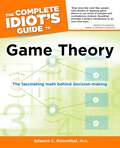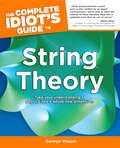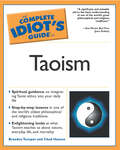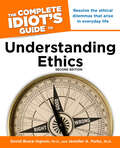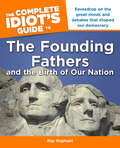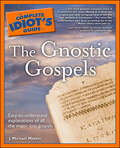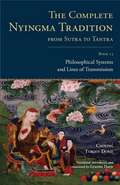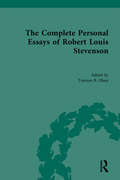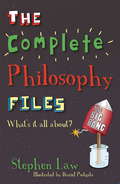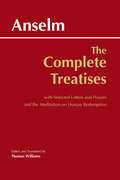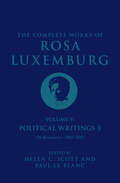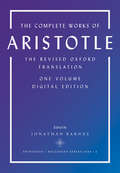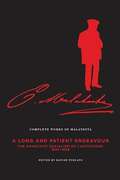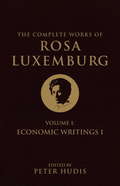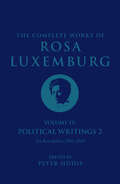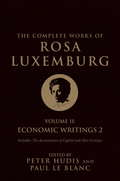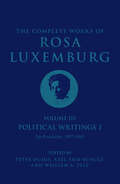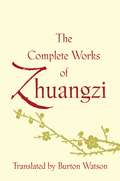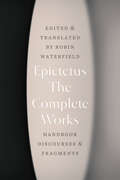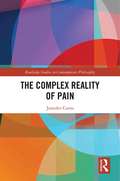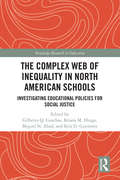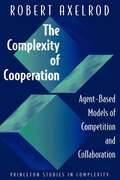- Table View
- List View
The Complete Idiot's Guide to Game Theory: The Fascinating Math Behind Decision-Making
by Edward C. RosenthalGain some insight into the game of life... Game Theory means rigorous strategic thinking. It is based on the idea that everyone acts competitively and in his own best interest. With the help of mathematical models, it is possible to anticipate the actions of others in nearly all life's enterprises. This book includes down-to-earth examples and solutions, as well as charts and illustrations designed to help teach the concept. In The Complete Idiot's Guide® to Game Theory, Dr. Edward C. Rosenthal makes it easy to understand game theory with insights into: • The history of the discipline made popular by John Nash, the mathematician dramatized in the film A Beautiful Mind • The role of social behavior and psychology in this amazing discipline • How important game theory has become in our society and why
The Complete Idiot's Guide to String Theory: Take Your Understanding of Physics into a Whole New Dimension!
by George MusserWe&’re living in the midst of a scientific revolution that&’s captured the general public&’s attention and imagination. The aim of this new revolution is to develop a &“theory of everything&”—a set of laws of physics that will explain all that can be explained, ranging from the tiniest subatomic particle to the universe as a whole. Here, readers will learn the ideas behind the theories, and their effects upon our world, our civilization, and ourselves.The Complete Idiot&’s Guide® String Theory explains how this exciting idea holds up against competing theories. In this Complete Idiot&’s Guide®, you get:• Clear explanation of quantum mechanics, Einstein&’s theories of relativity, and how string theory unites them. • A quick, easy-to-understand overview of competing theories and how they might be tested.• Fast facts about black holes, what&’s inside them, how they&’re made, and why they&’re so paradoxical. • Simple, smart tips to help you visualize extra dimensions.
The Complete Idiot's Guide to Taoism
by Brandon Toropov Chadwick HansenYou&’re no idiot, of course. You know Taoism is one of the world&’s oldest religions, based on simplicity and balance. However, you may not know it has important parallels with modern Western life: health, ecology, even in such pop culture icons as Luke Skywalker and the Beatles. But you don&’t have to sit at the feet of a Taoist master to learn how the Taoist tradition has enlightened seekers throughout the centuries! The Complete Idiot&’s Guide® to Taoism will show you exactly why Taoist principles appeal to people from every walk of life! In this Complete Idiot&’s Guide®, you get: • The history of the Daode Jing, the world&’s shortest core religious text, and Laozi, its mysterious author. • The teachings of Zhuangzi, the often-overlooked master sage of Taoism. • An explanation of yin-yang and what it represents. • Taoism&’s relationship to Zen Buddhism.
The Complete Idiot's Guide to Understanding Ethics, 2nd Edition: Resolve the Ethical Dilemmas That Arise in Everyday Life
by David Ingram Jennifer A. ParksEthics are more than a personal philosophyFrom the crimes of Bernie Madoff to the accusations of war crimes and torture to the massive greed-inspired fraud perpetrated by the financial institutions around the world, this new edition of The Complete Idiot's Guide® to Understanding Ethics, Second Edition, helps clarify the history and evolution of ethics and their application to real life in the twenty-first century. • Covers ethics in such hot button topics as politics, war, medicine, and business and finance • Features up–to–date ideas on ethical behavior on the Internet when dealing with privacy issues • Discusses the personal ethics surrounding reproductive issues
The Complete Idiot's Guide to the Founding Fathers: Eavesdrop on the Great Mind and Debates That Shaped Our Democracy
by Ray RaphaelEssential reading for anyone interested in the leaders who shaped our nation Popular interest in the Founding Fathers has surged over the past decade and is beginning to rival interest in the Civil War. People are increasingly looking back to the generation that invented this country's political ideas and institutions for help in today's complex political world. The Complete Idiot's Guide® to the Founding Fathers presents the Founding Fathers through the issues that defined them-issues that are with the country today.
The Complete Idiot's Guide to the Gnostic Gospels
by J. Michael MatkinThe birth of the Christian Church—and what it means for modern religion and philosophy. This engaging guide presents an accessible overview of the birth of the Christian Church, using the historical works found at the famous Nag Hammadi site in Egypt. With chapters discussing each of the major and minor documents found at Nag Hammadi, this volume also includes an overview of Gnosticism and the major players, revealing not only what the texts say, but also what they mean. - Renewed interest in Gnosticism and the Gnostic gospels is driven by interest in the Nag Hammadi documents, The Da Vinci Code, the Matrix movies, the Kabbalah, renewed interest in the divine feminine ideal, and the fact that many who&’ve left the Church are looking for new answers in the early church. - Author is a scholar and expert who&’s studied with some of the top people in the field.
The Complete Nyingma Tradition from Sutra to Tantra, Book 13: Philosophical Systems and Lines of Transmission (The Complete Nyingma Tradition #2)
by Gyurme Dorje Choying Tobden Dorje Lama TharchinChöying Tobden Dorje's magnum opus presented in English for the first time, in an authoritative translation prepared under the auspices of well-known and highly respected Tibetan teachers and translators. In 1838, Choying Tobden Dorje, a yogin and scholar of northeastern Tibet, completed a multivolume masterwork that traces the entire path of the Nyingma tradition of Tibetan Buddhism from beginning to end. Written by a mantra practitioner for the benefit of mantra practitioners living among the lay community, it was intended to be informative, inspirational, and above all, practical. Its twenty-five books, or topical divisions, offer a comprehensive and detailed view of the Buddhist path according to the early translation school of Tibetan Buddhism, spanning the vast range of Buddhist teachings from the initial steps to the highest esoteric teachings of great perfection. Choying Tobden Dorje’s magnum opus appears in English here for the first time.Book 13 presents the philosophical systems of India and Tibet, according to the writings of Longchen Rabjam and the revelations of Orgyan Lingpa. First, it discusses the views attributed to classical Hinduism, Jainism, materialism, and nihilism. Second, it describes the standpoints of the Vaibhashika and Sautrantika exponents of the lesser vehicle, exemplified by pious attendants and hermit buddhas, and the Cittamatra (“mind only”) and Madhyamaka (“middle way”) commentators of the great vehicle, exemplified by great bodhisattva beings. Third, it analyzes the inner and outer vehicles of the Buddhist tantras, with an emphasis on the three classes of the great perfection. Fourth, it documents the lines of philosophical transmission within Tibet, including Bon, Nyingma, Kagyu, Sakya, Kadampa, and Geluk. It concludes with an extract from a well-known treatise of the Fifth Dalai Lama, applying the techniques of consequential reasoning to the first chapter of Vasubandhu’s Treasury of Phenomenology.
The Complete Personal Essays of Robert Louis Stevenson
by Trenton B. OlsenFor all of Robert Louis Stevenson’s achievements in fiction, many of his contemporaries thought of him primarily as an essayist. His essays, known for their intellectual substance, emotional force, and stylistic vitality, were widely considered the best of their time. Despite the importance of Stevenson’s nonfiction, his personal essays—70 in total—have never been printed together in a single volume until now. Stevenson’s essays explore a range of topics from illness and evolution to marriage and dreams, and from literal and literary travel to the behavior of children and the character of dogs. Grappling with many of the cultural, ethical, and existential questions of his age, he resists dogma to draw fresh conclusions. Stevenson examines beggars and university students, immigrants and engineers, invalids and nurses, outlining his own colorful life story and unique approach to "the art of living" along the way. Whereas the most common and widely available versions of these texts were modified after Stevenson’s death, this volume gathers his personal essays, many of which have never appeared in any modern edition, in their authorized versions. These essays are still considered classic models of the form, and in this volume, the Editor presents them alongside an introduction and notes to assist in a rereading and reappreciation that is long overdue.
The Complete Philosophy Files
by Stephen Law Daniel PostgateIs there a God, should I eat meat, where does the universe come from, could I live for ever as a robot? These are the big questions readers will be wrestling with in this thoroughly enjoyable book. Dip into any chapter and you will find lively scenarios and dialogues to take you through philosophical puzzles ancient and modern, involving virtual reality, science fiction and a host of characters from this and other planets. The text is interspersed on every page with lively cartoons, and there is a list of philosophical jargon at the end..Stephen Law has a gift for communicating complex ideas. He offers few answers, but his unstuffy, highly personal approach will have the reader thinking and arguing with as much pleasure as he does himself.
The Complete Philosophy Files
by Stephen LawIs there a God, should I eat meat, where does the universe come from, could I live for ever as a robot? These are the big questions readers will be wrestling with in this thoroughly enjoyable book. Dip into any chapter and you will find lively scenarios and dialogues to take you through philosophical puzzles ancient and modern, involving virtual reality, science fiction and a host of characters from this and other planets. The text is interspersed on every page with lively cartoons, and there is a list of philosophical jargon at the end..Stephen Law has a gift for communicating complex ideas. He offers few answers, but his unstuffy, highly personal approach will have the reader thinking and arguing with as much pleasure as he does himself.
The Complete Treatises: with Selected Letters and Prayers and the Meditation on Human Redemption (Hackett Classics)
by AnselmAn expanded version of the translator&’s Anselm: The Basic Writings, The Complete Treatises incorporates new translations of works omitted from that volume (most notably, De grammatico) in addition to selected letters and prayers of philosophical interest. The only such collection translated by a single hand and rendered with attention to terminological consistency across the treatises, it&’s the ideal choice for use by students of philosophy and theology.
The Complete Works Volume of Rosa Luxemburg: Volume V
by Rosa LuxemburgThis volume is the first to contain all of Luxemburg&’s eloquent writings on the 1917 Russian Revolution and 1918-19 German RevolutionThis volume is the first to contain all of Luxemburg&’s eloquent writings on the 1917 Russian and 1918-19 German Revolutions. It also contains articles, essays and manuscripts on the European socialist movement prior to World War I and her effort to rebuild the socialist movement on revolutionary foundations in its aftermath.Much of this material appears in English for the first time. Her incisive contributions on revolutionary strategy, the German and Russian Revolutions, and the transition to socialism reveal a profound commitment to radical democracy, which becomes evident as she elaborates on her lived experience with razor-sharp conceptualizations of the mass strike.Her democratic commitment is also highlighted in her deepening conflict with the bureaucratic conservatism afflicting the German Social Democratic Party.She is horrified yet at the same time grimly analytical while surveying the unfolding violence and brutality of the First World War.Deeply inspired by Russia&’s 1917 upsurge, she is nonetheless compelled to analyze and criticize fatal limitations of the Russian Revolution.Swept up in the revolutionary chaos sweeping through Germany in 1918-1919 which results in her own martyrdom, she gives voice to revolution&’s final testament: &“I was, I am, I shall be.&”
The Complete Works of Aristotle
by Aristotle Jonathan BarnesThis digital edition combines, for the first time, both volumes of The Complete Works of Aristotle: The Revised Oxford Translation, which is universally recognized as the standard English version.The Oxford Translation of Aristotle was originally published in twelve volumes between 1912 and 1954. The revised edition contains the substance of the original translation, slightly emended in light of recent scholarship; three of the original versions have been replaced by new translations; and a new and enlarged selection of fragments has been added. The aim of the translation remains the same: to make the surviving works of Aristotle readily accessible to English-speaking readers.
The Complete Works of Malatesta V.III: The Anarchist Socialism of L'Agitazione, 189798
by Paul Sharkey Errico Malatesta Davide TurcatoThe first in AK Press's ten-volume Complete Works of Malatesta. This one (volume three chronologically) focuses on two very important years in Errico Malatesta's life, when he returned to Italy to edit L'Agitazione. This volume begins the series with a bang.
The Complete Works of Rosa Luxemburg
by Rosa Luxemburg Peter HudisThis first volume of Rosa Luxemburg's Complete Works, entitled Economic Writings I, will contain some of Luxemburg's most important writings on the globalization of capital, wage labor, imperialism and pre-capitalist economic formations, most of which have never before appeared in English. In addition to including a new translation of her doctoral dissertation, The Industrial Development of Poland, it will include the first complete English translation of her Introduction to Political Economy, which explores (among other issues) the impact of capitalist commodity production and industrialization upon non-capitalist social strata in the developing world.The volume will also include ten recently discovered manuscripts, all of which will appear in English for the first time.
The Complete Works of Rosa Luxemburg Volume IV: Political Writings 2, On Revolution (1906-1909)
by Rosa LuxemburgPart Four of a comprehensive collection of Rosa Luxemburg's writingThis 600-page volume of Luxemburg's Complete Works contains her writings "On Revolution" from 1906 to 1909--covering the 1905-06 Russian Revolution, one of the most important revolutions of modern times, and its aftermath. The volume contains numerous writings never before in available in English, such her pathbreaking essay, "Lessons of the Three Dumas," which presents a unique perspective on the transition socialism, her "Notes on the English Revolution" of the 1640's, and numerous writings on of the role of the mass strike in fomenting revolutionary transformation. All of the material in the volume consists of new translations, from German, Polish, and Russian originals.
The Complete Works of Rosa Luxemburg, Volume II
by Rosa Luxemburg Peter Hudis Paul Le BlancRosa Luxemburg (1871-1919) is widely regarded as one of the most creative writers of modern socialism and the foremost female theoretician of European radicalism. Her wide-ranging and incisive works, which include studies on capitalism's inherent drive for global expansion, the relation between spontaneity and organization, and the inseparability of democracy and socialism, have made her a pole of attraction for theorists and activists around the world. Her fiercely independent intellect and uncompromising defense of human liberty speaks more powerfully to our era than to any other.This volume contains a new English translation of Luxemburg's most important book, The Accumulation of Capital (1913) as well as her response to its critics. Taken together, they constitute one of the most important Marxist studies of the globalization of capital.
The Complete Works of Rosa Luxemburg, Volume III: Political Writings 1: On Revolution-1897-1905
by Rosa Luxemburg Peter HudisRosa Luxemburg's theoretical masterpieceThis collection is the first of three volumes of the Complete Works devoted to the central theme of Rosa Luxemburg’s life and work—revolution. Spanning the years 1897 to the end of 1905, they contain speeches, articles, and essays on the strikes, protests, and political debates that culminated in the 1905 Russian Revolution—one of the most important social upheavals of modern times. Luxemburg’s near-daily articles and reports during 1905 on the ongoing revolution (which comprises the bulk of this volume) shed new light on such issues as the relation of spontaneity and organization, the role of national minorities in social revolution, and the inseparability ofthe struggle for socialism from revolutionary democracy. We become witness to Luxemburg’s effort to respond to the impulses, challenges, and ideas arising from a living revolutionary process, which in turn becomes the source of much of her subsequent political theory—such as her writings on the mass strike, her strident internationalism, and her insistence that revolutionary struggle never take its eyes off of the need to transform the human personality.Virtually all of these writings appear in English for the first time (translated from both German and Polish) and many have only recently been identified as having been written by Luxemburg.
The Complete Works of Zhuangzi
by Burton WatsonOnly by inhabiting Dao (the Way of Nature) and dwelling in its unity can humankind achieve true happiness and freedom, in both life and death. This is Daoist philosophy's central tenet, espoused by the person -- or group of people -- known as Zhuangzi (369?-286? B.C.E.) in a text by the same name. To be free, individuals must discard rigid distinctions between good and bad, right and wrong, and follow a course of action not motivated by gain or striving. When one ceases to judge events as good or bad, man-made suffering disappears and natural suffering is embraced as part of life.Zhuangzi elucidates this mystical philosophy through humor, parable, and anecdote, deploying non sequitur and even nonsense to illuminate a truth beyond the boundaries of ordinary logic. Boldly imaginative and inventively worded, the Zhuangzi floats free of its historical period and society, addressing the spiritual nourishment of all people across time. One of the most justly celebrated texts of the Chinese tradition, the Zhuangzi is read by thousands of English-language scholars each year, yet only in the Wade-Giles romanization. Burton Watson's pinyin romanization brings the text in line with how Chinese scholars, and an increasing number of other scholars, read it.
The Complete Works of Zhuangzi (Translations from the Asian Classics)
by Burton WatsonOnly by inhabiting Dao (the Way of Nature) and dwelling in its unity can humankind achieve true happiness and freedom, in both life and death. This is Daoist philosophy's central tenet, espoused by the person—or group of people—known as Zhuangzi (369?-286? B.C.E.) in a text by the same name. To be free, individuals must discard rigid distinctions between good and bad, right and wrong, and follow a course of action not motivated by gain or striving. When one ceases to judge events as good or bad, man-made suffering disappears and natural suffering is embraced as part of life.Zhuangzi elucidates this mystical philosophy through humor, parable, and anecdote, deploying non sequitur and even nonsense to illuminate a truth beyond the boundaries of ordinary logic. Boldly imaginative and inventively worded, the Zhuangzi floats free of its historical period and society, addressing the spiritual nourishment of all people across time. One of the most justly celebrated texts of the Chinese tradition, the Zhuangzi is read by thousands of English-language scholars each year, yet only in the Wade-Giles romanization. Burton Watson's pinyin romanization brings the text in line with how Chinese scholars, and an increasing number of other scholars, read it.
The Complete Works: Handbook, Discourses, & Fragments
by Epictetus“This is now the best English translation of Epictetus available . . . a reliable and up-to-date guide to the most influential Stoic in today’s world.” —Brad Inwood, author of Stoicism: A Very Short Introduction“Some things are up to us and some are not.”Epictetus was born into slavery around the year 50 CE, and, upon being granted his freedom, he set himself up as a philosophy teacher. After being expelled from Rome, he spent the rest of his life living and teaching in Greece. He is now considered the most important exponent of Stoicism, and his surviving work comprises a series of impassioned discourses, delivered live and recorded by his student Arrian, and the Handbook, Arrian’s own take on the heart of Epictetus’s teaching.In Discourses, Epictetus argues that happiness depends on knowing what is in our power to affect and what is not. Our internal states and our responses to events are up to us, but the events themselves are assigned to us by the benevolent deity, and we should treat them—along with our bodies, possessions, and families—as matters of indifference, simply making the best use of them we can. Together, the Discourses and Handbook constitute a practical guide to moral self-improvement, as Epictetus explains the work and exercises aspirants need to do to enrich and deepen their lives. Edited and translated by renowned scholar Robin Waterfield, this book collects the complete works of Epictetus, bringing to modern readers his insights on how to cope with death, exile, the people around us, the whims of the emperor, fear, illness, and much more.“Waterfield’s clear, readable translation brings out Epictetus’ humour and conversational tone as well as his philosophical vision.” ―London Review of Books
The Complex Reality of Pain (Routledge Studies in Contemporary Philosophy)
by Jennifer CornsThis book employs contemporary philosophy, scientific research, and clinical reports to argue that pain, though real, is not an appropriate object of scientific generalisations or an appropriate target for medical intervention. Each pain experience is instead complex and idiosyncratic in a way which undermines scientific utility. In addition to contributing novel arguments and developing a novel position on the nature of pain, the book provides an interdisciplinary overview of dominant models of pain. The author lays the needed groundwork for improved models and targeted treatments at a time when pain science, pain medicine, and philosophy are explicitly searching for both and failing to find them. The Complex Reality of Pain will be of interest to a broad range of researchers and students, including those working in philosophy of mind, philosophy of science, cognitive science, neuroscience, medicine, health, cognitive and behavioural psychology, and pain science.
The Complex Web of Inequality in North American Schools: Investigating Educational Policies for Social Justice (Routledge Research in Education)
by Gilberto Q. Conchas Briana M. Hinga Miguel N. Abad Kris D. GutiérrezThe Complex Web of Inequality in North American Schools analyzes and challenges the critical gaps and inequalities that persist in the American school system. Showing how historical biases have been inherited in current polices relating to non-dominant youth, the text calls for educational reforms that perform in the name of social justice. This edited collection carefully interrogates how technocratic educational policies and reforms are often unequipped to address the interplay of political, social, economic, ideological factors that are at the roots of educational injustice. Considering the most vulnerable student populations, original case studies explore how inadequate structures, practices, and beliefs have increased marginalization, and highlight those instances in which policy has proved effective in reducing opportunity gaps between economically rich and poor students; between white, Asian, Black and Latino youth; between native English speakers and second language learners; highlighting racial integration and unequal American Indian education; and for students with special educational needs. The insights into such policies shed light on the complex web of historically embedded inequities that continue to shape the construction, roll-out, and consequences of education policy for the most marginalized youth populations today. This volume will be of interest to graduate, and postgraduate students, researchers and academics in the fields of education policy, sociology of education, economics of education, and history of education, and well as policy evaluation.
The Complexity of Cooperation: Agent-Based Models of Competition and Collaboration (Princeton Studies in Complexity #3)
by Robert AxelrodRobert Axelrod is widely known for his groundbreaking work in game theory and complexity theory. He is a leader in applying computer modeling to social science problems. His book The Evolution of Cooperation has been hailed as a seminal contribution and has been translated into eight languages since its initial publication. The Complexity of Cooperation is a sequel to that landmark book. It collects seven essays, originally published in a broad range of journals, and adds an extensive new introduction to the collection, along with new prefaces to each essay and a useful new appendix of additional resources. Written in Axelrod's acclaimed, accessible style, this collection serves as an introductory text on complexity theory and computer modeling in the social sciences and as an overview of the current state of the art in the field. The articles move beyond the basic paradigm of the Prisoner's Dilemma to study a rich set of issues, including how to cope with errors in perception or implementation, how norms emerge, and how new political actors and regions of shared culture can develop. They use the shared methodology of agent-based modeling, a powerful technique that specifies the rules of interaction between individuals and uses computer simulation to discover emergent properties of the social system. The Complexity of Cooperation is essential reading for all social scientists who are interested in issues of cooperation and complexity.
The Complexity of Self Government
by Ruth LaneThe Complexity of Self Government represents a revolutionary approach to political science. Bottom-up theory turns political and social analysis upside down by focusing analytic attention not on vacuous abstractions but on the individual men and women who either consciously or inadvertently create the institutions within which they live. Understanding this practical level of human activity is made possible through complexity theory, recently developed in computer models, but of wider use in understanding everyday human behaviour. To this complexity framework, the book adds social science to give life and colour to the analytical picture: micro-sociology from Garfinkel and Goffman, anthropology from Bourdieu, and non-technical game theory based on Thomas Schelling's microanalytics, to give rigour and bite. Theoretical examples include India's Mumbai, Iran, the marshes of southern Iraq, Berlusconi's Italy, backcountry China, Zimbabwe, and Nelson Mandela's revolution in South Africa.
